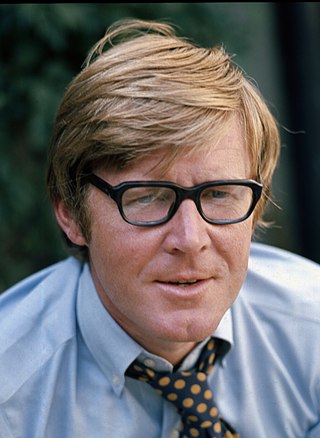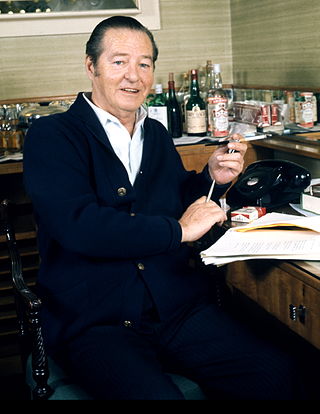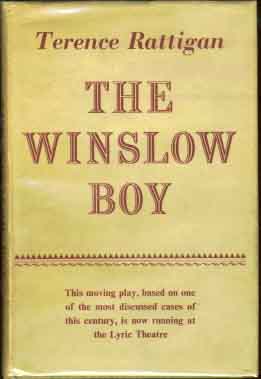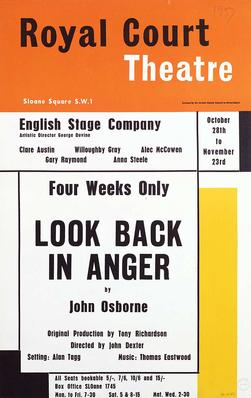Related Research Articles

Leonard Rossiter was an English actor. He had a long career in the theatre but achieved his highest profile for his television comedy roles starring as Rupert Rigsby in the ITV series Rising Damp from 1974 to 1978, and Reginald Perrin in the BBC's The Fall and Rise of Reginald Perrin from 1976 to 1979.

Alan Bennett is an English actor, author, playwright, and screenwriter. Over his entertainment career he has received numerous awards and honours including two BAFTA Awards, four Laurence Olivier Awards, and two Tony Awards. He also earned an Academy Award nomination for his film The Madness of King George (1994). In 2005 he received the Society of London Theatre Special Award.
Sir Ralph David Richardson was an English actor who, with John Gielgud and Laurence Olivier, was one of the trinity of male actors who dominated the British stage for much of the 20th century. He worked in films throughout most of his career, and played more than sixty cinema roles. From an artistic but not theatrical background, Richardson had no thought of a stage career until a production of Hamlet in Brighton inspired him to become an actor. He learned his craft in the 1920s with a touring company and later the Birmingham Repertory Theatre. In 1931 he joined the Old Vic, playing mostly Shakespearean roles. He led the company the following season, succeeding Gielgud, who had taught him much about stage technique. After he left the company, a series of leading roles took him to stardom in the West End and on Broadway.

Sir Terence Mervyn Rattigan was a British dramatist and screenwriter. He was one of England's most popular mid-20th-century dramatists. His plays are typically set in an upper-middle-class background. He wrote The Winslow Boy (1946), The Browning Version (1948), The Deep Blue Sea (1952) and Separate Tables (1954), among many others.

John James Osborne was an English playwright, screenwriter, actor, and entrepreneur, who is regarded as one of the most influential figures in post-war theatre. Born in London, he briefly worked as a journalist before starting out in theatre as a stage manager and actor. He lived in poverty for several years before his third produced play, Look Back in Anger (1956), brought him national fame.

Sir Jonathan Wolfe Miller CBE was an English theatre and opera director, actor, author, television presenter, humourist and physician. After training in medicine and specialising in neurology in the late 1950s, he came to prominence in the early 1960s in the comedy revue Beyond the Fringe with Peter Cook, Dudley Moore and Alan Bennett.

The Winslow Boy is an English play from 1946 by Terence Rattigan based on an incident involving George Archer-Shee in the Edwardian era. The incident took place at the Royal Naval College, Osborne.

Look Back in Anger (1956) is a realist play written by John Osborne. It focuses on the life and marital struggles of an intelligent and educated but disaffected young man of working-class origin, Jimmy Porter, and his equally competent yet impassive upper-middle-class wife Alison. The supporting characters include Cliff Lewis, an amiable Welsh lodger who attempts to keep the peace; and Helena Charles, Alison's snobbish friend.

Doctor in the House is a 1954 British comedy film directed by Ralph Thomas and starring Dirk Bogarde, Kenneth More, Donald Sinden, Donald Houston and James Robertson Justice. It was produced by Betty Box. The screenplay, by Nicholas Phipps, Richard Gordon and Ronald Wilkinson, is based on the 1952 novel Doctor in the House by Gordon, and follows a group of students through medical school.
George Innes Llewelyn Lloyd was a Welsh television producer. He had a long career in BBC drama, which included producing series such as Doctor Who and Talking Heads.

Richard Cameron Wattis was an English actor, co-starring in many popular British comedies of the 1950s and 1960s.

Billy Liar is a 1963 British CinemaScope comedy-drama film based on the 1959 novel by Keith Waterhouse. Directed by John Schlesinger, it stars Tom Courtenay as Billy and Julie Christie as Liz, one of his three girlfriends. Mona Washbourne plays Mrs. Fisher and Wilfred Pickles plays Mr. Fisher. Rodney Bewes, Finlay Currie and Leonard Rossiter also feature. The Cinemascope photography is by Denys Coop and Richard Rodney Bennett supplied the score.
Habeas Corpus is a stage comedy in two acts by the English author Alan Bennett. It was first performed at the Lyric Theatre in London on 10 May 1973, with Alec Guinness in the central role. It ran, with cast changes, until 10 August 1974. The Broadway production that followed was less successful, running for less than three months. The play has been revived several times since then, in London and elsewhere.

Home is a play by David Storey. It is set in a mental asylum, although this fact is only revealed gradually as the story progresses. The four primary characters are seemingly benign Harry, highly opinionated Jack, cynical Marjorie, and flirtatious Kathleen. As they interact we come to realize their delusions and pretensions are similar to those of people living in a supposedly normal society.

Clive Stanley Donner was a British film director who was part of the British New Wave, directing films such as The Caretaker, Nothing but the Best, What's New Pussycat?, and Here We Go Round the Mulberry Bush. He also directed television movies and commercials through the mid-1990s.

The Collector is a 1965 psychological horror film directed by William Wyler and starring Terence Stamp and Samantha Eggar. Its plot follows a young Englishman who stalks a beautiful art student before abducting and holding her captive in the basement of his rural farmhouse. It is based on the 1963 novel of the same title by John Fowles, with the screenplay adapted by Stanley Mann and John Kohn. Wyler turned down The Sound of Music to direct the film.

Another Country is a 1984 British romantic historical drama written by Julian Mitchell, adapted from his play of the same name. Directed by Marek Kanievska, the film stars Rupert Everett and Colin Firth in his feature film debut.

Richard de Pearsall Pearson was a British character actor who appeared in numerous film, television and stage productions over a period of 65 years. He played leading roles in several London West End plays and also supported Maggie Smith, Robert Morley and others in long-running West End stage productions. His many screen appearances included character parts in three Roman Polanski films.

This Man in Paris is a 1939 British comedy mystery film directed by David MacDonald and starring Barry K. Barnes, Valerie Hobson and Alastair Sim.
Sir Michael Victor Codron is a British theatre producer, known for his productions of the early work of Harold Pinter, Christopher Hampton, David Hare, Simon Gray and Tom Stoppard. He has been honoured with a Laurence Olivier Award for Lifetime Achievement, and is a stakeholder and director of the Aldwych Theatre in the West End, London.
References
- Bennett, Alan (1972) Getting On Faber and Faber, London.
- Bergan, Ronald (1989) Beyond the Fringe...and Beyond Virgin, London.